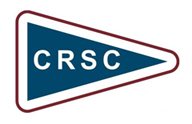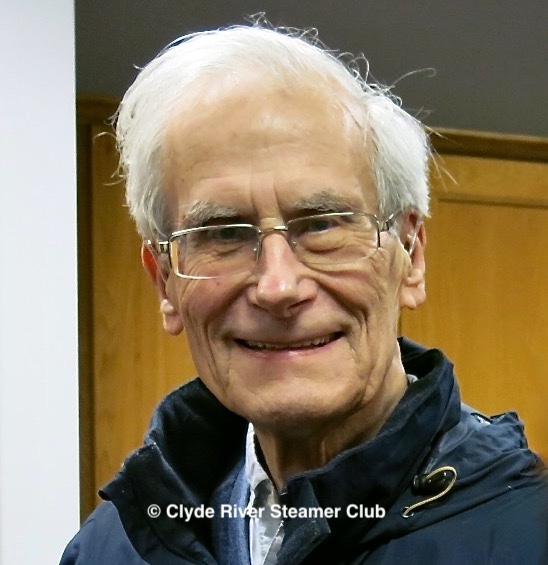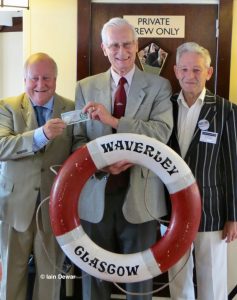John Whittle, who has died aged 90, played a pivotal role in establishing Caledonian MacBrayne as a modern ferry company, but he will also be remembered as the executive who negotiated the handover of Waverley from state ownership to a group of steamer preservationists. Tribute by Andrew Clark.
A strong but sympathetic manager. A mild-mannered man. A gentle giant. The epithets that have been used to describe John Whittle tell only half the story of how a former busman won the grudging admiration of island communities and became the friend of steamer enthusiasts.
John — as he was known to us all during his long retirement — was faced in the early 1970s with the task of managing the merger of two old-fashioned shipping companies (the Caledonian Steam Packet Company and David MacBrayne Ltd) and transforming them into a modern ferry company. That he did so successfully — calmly parrying the brickbats and pacifying the entrenched opponents of change — can be ascribed to his temperate nature, his willingness to listen and his gift for managing people.
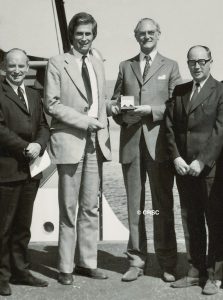
John Whittle (second left) c1978 at a CalMac retirement presentation for purser Donald MacNaughton (second right). Click to enlarge
The same qualities came to bear on his handling of the sale of Waverley in 1973-74 to Douglas McGowan, Terry Sylvester and their PSPS associates, after the paddler was judged an expensive liability by her state-owned operator. He had struck up a dialogue with the young enthusiasts, so much so that a degree of warmth and trust developed, enabling the sale ‘for a pound’ to proceed with minimal hiccups — even though the initial agreement that CalMac would operate the vessel on their behalf fell through. John later became a staunch supporter of the paddler.
John was well enough only last week to send a pre-Christmas email to Douglas and Terry, in which — with a hint of his characteristic sense of humour — he thanked the pair “for the support you gave [CalMac] as our unpaid marketing consultants [in 1971-73] and for establishing the firm foundations on which Waverley’s 50 years [of operational preservation] have been built.”
Born in London in 1933, Norman John Derek Whittle was evacuated to Chichester during the early years of the Second World War. He moved to Scotland in 1942 when his father was sent north to manage a military supply depot at Rouken Glen, Glasgow: the family arrived a few days before Clydebank was blitzed. After four years of study for his Chartered Institute of Transport exams, John worked first for Glasgow Corporation Transport and then the Motherwell-based SMT bus company, where he became traffic manager.
When, in 1968, he was summoned for a meeting at Scottish Bus Group headquarters in Edinburgh, he had no idea he was being groomed to assume responsibility for the new transport conglomerate’s shipping arm at Gourock. In an 80th birthday interview with CRSC in 2013, he said his 1969 appointment as manager of the Caledonian Steam Packet Company came as “a major culture shock. I remember asking myself ‘What the hell am I doing, taking this on?’.”
At Central SMT he had become accustomed to working at a very profitable company. CSP staff had serious reservations about a bus manager taking over, while in the islands “there was a lot of concern about what we were doing. Trying to get the company to turn in a profit on bus company lines would have necessitated a sacrifice in quality and price. The other way to go was to improve productivity and quality of service. We weren’t just a business. We had a responsibility to the community.”
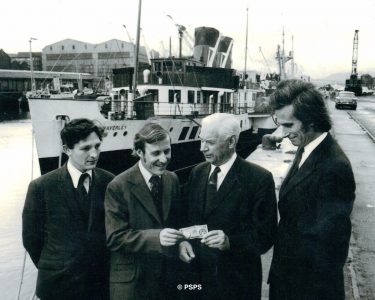
John Whittle (right) witnesses the handover of the pound note that secured the future of Waverley on 8 August 1974, with Terry Sylvester (left), Douglas McGowan and STG chairman Colonel Sir Patrick Thomas
And so raising productivity became a primary goal, starting at the CSP’s Gourock headquarters. “No one, apart from the general manager, had any financial information,” he recalled. “The business was run on a ‘bums on seats’ principle, rather than profit/loss. No one asked what financial impact their actions had on what they were doing. That was alien to me. I wanted management to work as a team, with common objectives and common responsibility. I found some excellent people working for the company, and they responded extremely well. It was the same with MacBraynes when the two companies came together in 1973.”
Among his biggest headaches in the early 1970s was the storm of protest on Arran over the introduction of MV Caledonia, a former Swedish ferry imported (and converted at great expense) to introduce roll-on/roll-off operation to the Ardrossan-Brodick service. Her tiny winter passenger certificate meant that travellers sometimes had to be left behind. Another problem-child was Clansman after her failed 1973-74 transformation into a drive-through ferry.
His greatest challenge was persuading island communities to accept that the era of cargo boats had passed and linkspan operation was the way forward.
It was while returning from a consultation with the South Uist community in March 1973 that he had the misfortune to be one of 10 passengers aboard the ageing mailboat Loch Seaforth when she was holed in Gunna Sound on her way back from Lochboisdale. Everyone was taken to safety but the vessel sank at Tiree and became a write-off.
But John Whittle also oversaw the introduction of the ‘streakers’ on the Clyde, and Pioneer, the 1978 Claymore and the 1979 Lochmor in the Hebrides.
After giving up his executive responsibilities at Gourock in 1983, John became the STG’s head of planning, marketing and public affairs, based at its Edinburgh headquarters, though he remained a CalMac director. He retired when the STG was wound up in 1989, and latterly lived contentedly at home near Carstairs.
John Whittle’s association with CRSC began in 1972, when he was guest of honour at the Club’s 40th anniversary dinner, and he was guest of honour again at our 80th anniversary celebration in November 2012. He was made an honorary member of CRSC in November 2013, and regularly attended our meetings in Glasgow until shortly before lockdown in 2020.
John died early on Tuesday 19 December after a short respiratory illness. We extend our deepest sympathy to his wife Evelyn and the family.
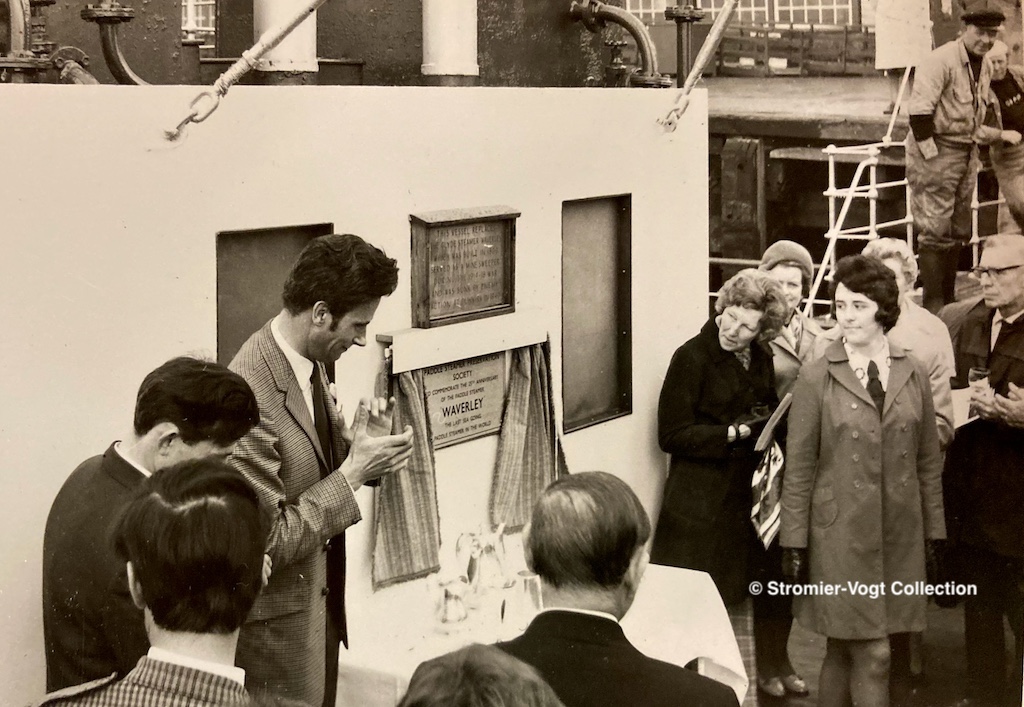
John Whittle (third left, next to Terry Sylvester) and Jean McGowan (right foreground) at the unveiling of a PSPS plaque commemorating the 25th anniversary of Waverley on 19 May 1972
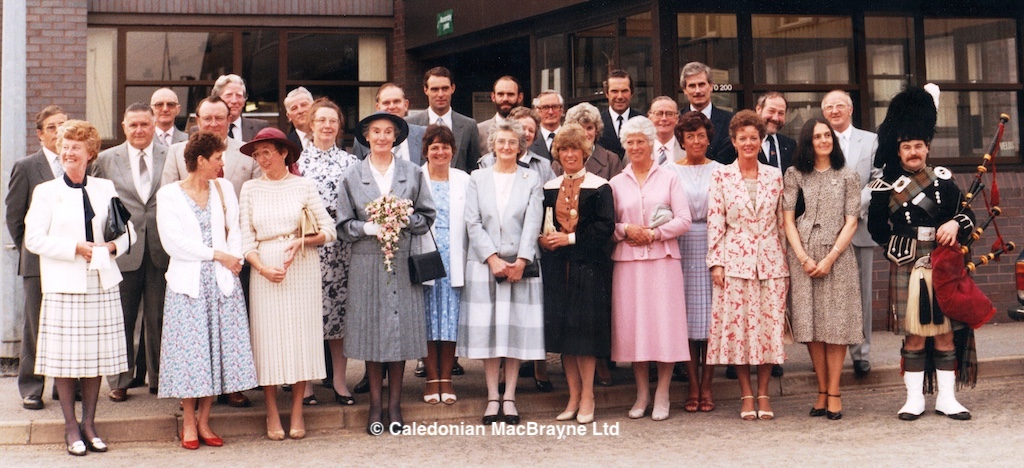
John Whittle (with moustache, third right back row) at the launch of Loch Striven at Hessle on 8 May 1986 (first of the ‘Loch’ class). Colin Paterson, CalMac’s first full-time chief executive, stands back row fifth left
Published on 19 December 2023
